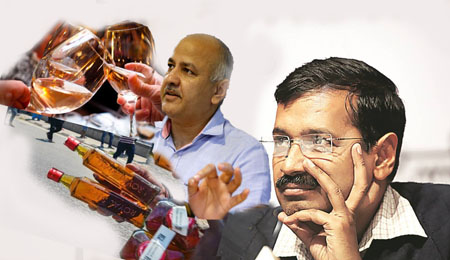“Corruption will go when the larger numbers of persons given to the unworthy practice realise that the nation does not exist for them, but that they do for the nation. It requires a high code of morals, extreme vigilance on the part of those who are free from the corrupt practice and also have influence over corrupt servants. Indifference in such matters is criminal.” — MK Gandhi, Harijan, February 01, 1948
The allegations of corruption on the Kejriwal-led Aam Aadmi Party (AAP) Government and his blue-eyed boy Manish Sisodia in the formulation and execution of the Liquor Excise Policy have rocked the politics not just in the Capital city but also nationally. After a few weeks of the Health Minister Satyendra Jain getting arrested on the charges related to Hawala, a report by the Chief Secretary of Delhi came up with a report on procedural lapses that allegedly took place in the new liquor policy. The irregularities pointed out are glaring and need a thorough investigation.
While announcing the formation of the Aam Aadmi Party in 2012, Arvind Kejriwal announced that a new political party would provide an ‘alternative politics for changing the system and giving power back to the people’. People will approve all the decisions, and the Gandhian principle of decentralised decision-making was a declared promise. Even now, AAP is a self-proclaimed political party that ‘avowedly adopts the anti-corruption platform’. Then, what went wrong with the liquor policy?
Amidst the horrific COVID-19 crisis, the Kejriwal Government’s priority was to change the earlier liquor policy by inviting private players into the business. Rationally, the Government has no reason to be in the liquor business. The core objective of the policy was to increase the treasury inflow. An increase in the number of liquor outlets, reduction in the permissible drinking age from 25 to 21, licence to liquor vends in the residential areas with special discount coupons and extension of the timing to serve alcohol from 10 pm to 3 am were important political initiatives. Kejriwal went ahead with the policy execution, despite protests from women in many parts of Delhi. Were local women involved while taking this decision? Why does the AAP Government want to encourage alcohol consumption in Delhi? What kind of Gandhian politics is this?
Last-minute changes in the policy without the Cabinet approval, a waiver of Rs 144 crores to private vendors against liquor licences in the pandemic, returning the earnest money to the vendors in the Airport Zone and promoting cartelisation are the key allegations against Manish Sisodia. Yes, these are just allegations; but the Delhi Government withdrew the supposedly beneficial policy immediately after the report became public. Was there any financial quid-pro-quo in the rolling out of this policy? What is the connection of these alleged irregularities with the Punjab elections? Was there a post-facto approval by the Cabinet to the rules modified after the tendering process? Were AAP activists involved in mediation while allocating the licences to the liquor barons? A party vouching for ‘clean politics’ should answer these questions.
Answers to these questions cannot be New York Times certifying the Delhi Model of Education. Even accusing the Bharatiya Janata Party (BJP) of either misusing the central investigation agencies or trying to break the AAP legislative party would not cover up the corruption charges. Unfortunately, Kejriwal started using the usual political tricks of diverting the issue in a different direction, instead of asking Satyendra Jain and Manish Sisodia to come clean.
Just a Few days back, Kejriwal praised the Punjab CM Bhagwant Mann for sacking Health Minister Vijay Singla for allegedly demanding a one per cent commission in tenders and purchases of his department, testifying for zero tolerance against corruption. AAP had certified all other parties as ‘corrupt’ at the time of formation, so repeating the same allegations does not make sense. Are transparency and accountability the articles of faith for Kejriwal and his AAP, or just election gimmicks? An answer to this central question will decide the credibility and future of the self-proclaimed corruption crusader.















Comments